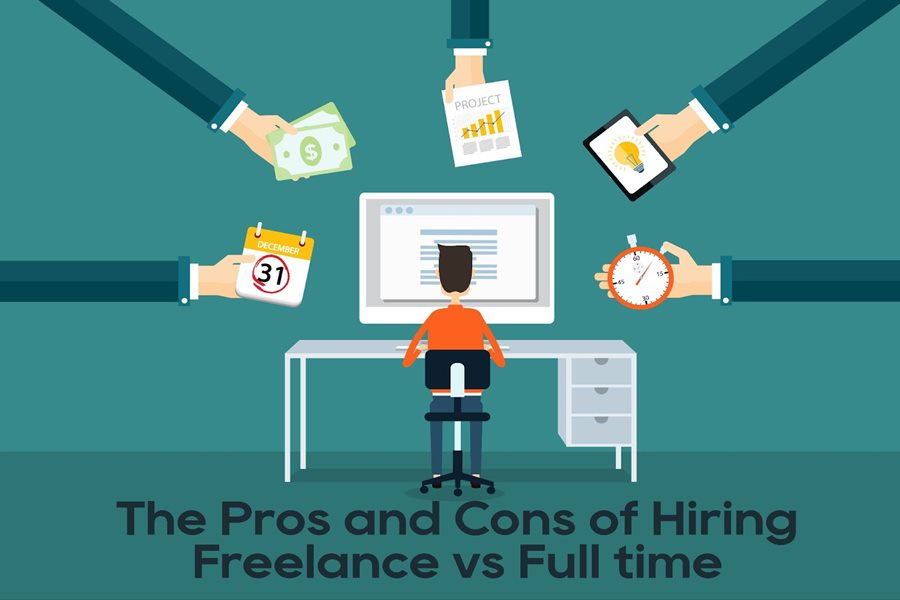In the past, employing the services or skills of a person in an organized setting almost assuredly meant that they would work for you and dedicate their skills to your business and yours alone. However, whilst the dedication to business has not changed, the proverbial eggs are now distributed amongst many baskets.
Telecommuting. The worldwide evolution from physical, more organized employment and work systems to more flexible, remote (work-from-home or telecommute) systems has led to the rise of freelancers. Asides the benefits the freelancers have from these arrangements, employers have found out that freelancers come with their specific benefits.
Sometimes it is not easy as an employer to determine which is best for your burgeoning or established business— whether to hire a freelancer to render services for you only when you need them, or to hire a permanent, full time staff that would consistently carry out your tasks and get fixed pay.
In order to holistically show you the best options that cater to varying needs, this article would examine the pros and cons of both hiring freelance or full time candidates in different situations. Check out these tips and thank me later.
Pros and Cons of Hiring Freelancers
Pros
1. Temporary Fix to Immediate Needs
Sometimes, when running an organization, some problems might surface that fall without the scope of the existing employees. For instance, in a company that solely engages in crypto work, a need might arise that requires the services of a writer— the provision of crypto-related content for the newly designed website. In such a situation, it would be a smarter financial decision to engage the services of a freelance content writer, rather than hire a permanent content writer. This is because jobs like this would not be consistently required in the day-to-day running of the firm, hence, the needlessness of incurring full-time costs.
The above example portrays that one of the major pros of hiring freelancers is that it enables you to provide a quick fix to a to organizational needs that are not consistent, without incurring recruitment and onboarding costs.
2. It Allows for Flexibility
In burgeoning organizations that do not have a steady influx of businesses, hiring freelancers play an advantageous role in keeping operating cost at a minimum.
The rationale for this is that when a growing organization is congested with work, the organization can afford to retain the services of freelancers to take care of the work. Because they are freelancers, there would be no need to pay things like bonuses, insurance and other side benefits. A set fee is usually agreed based on the particular job or a particular time period.
Conversely, when the work influx has reduced, the freelancers can easily move on without the payment of salaries. This helps the company save more in drought periods.
3. Regulatory Implications
The regulatory implications are in favor of hiring freelancers for start-ups. After setting up a startup, a founder has to consider tax regulations (e.g., PAYE), labor regulations, amongst other things. On the flip side, if freelancers are engaged, the company would be concerned mainly with solely contractual regulations, as most of the terms would be contained in the contract.
4. The final pro discussed here is that it is cheaper to hire freelancers than to hire full time employees.
Cons
1. Availability of Freelancers
A major argument against hiring freelancers is the fact that it may be difficult to guarantee their availability in time of need. Unlike full time workers that are always at your beck and call, freelancers usually work for more than one employer, hence, there might be times when you really need their services and they would be unavailable. Frustrating, right?
2. Hinders Consistency and Continuity
Well, this con kind of flows from the first one. Due to the unavailability of freelancers at some crucial moments, employers might be forced to engage the services of new freelance contractors to work on follow-ups to the work previously done by other freelancers. The implication is that the chances of having a consistent standard for all jobs done are slimmer than if a fulltime employee were in charge.
3. Slower Communication
The final con addressed here is the fact that communications are slower during freelancing. This stems from the unavailability of the freelancers to cater to every call.
Pros and Cons of Hiring Full Time
Pros
1. Consistent Standards
One of the major arguments for engaging a full time employee over a freelancer is the fact that with a full time employee, the standards of delivery with regard to the product or service would be consistent. A minimum standard can be ensured by the training of workers and supervision, amongst other things. This is suitable for established corporations and franchises.
2. Availability
Another benefit of hiring on a full time basis is the commitment, dedication and availability that accompanies arrangements of that nature. The rationale for this is that exclusivity avails the employees sufficient time to attend to every need of the organization or the employer.
3. Faster Communication
This is ensured as the employee is always available at the office or the designated platform of the organization. Therefore, if you want better communication, full time hiring is your best bet.
Cons
1. Expensive to Maintain
A major challenge with hiring full time employees is that they are expensive to maintain when compared to freelancers. This is especially applicable to startups and SMEs. Benefits like bonuses, insurance, paid leave are some of the major problems faced. These expenses remain across buoyant and non-buoyant periods in the company’s businesses.
2. Rigidity
Another con of hiring full time is that it is more difficult for the firm to get the right fix that is suitable for specific needs at every given moment.
Bottom Line
After examining the pros and cons of both freelancers and full time employees, it is evident that there is no hard and fast rule when making the decision on which of the group to hire. As a matter of fact, there could be a healthy blend. What is necessary is that you consider the peculiar needs of your business and make decisions based on that and the above analysis of the pros and cons of each group.



